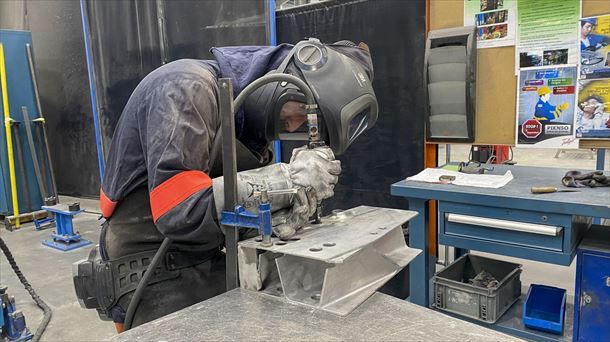When the central part of Kharkov was destroyed by the Russian bombing at the beginning of the invasion, among the hundreds of buildings that were targeted was the historic House of Speech (Slovo) From the city.
The apartment building, built by the Soviet government in the 1920s for the Ukrainian writers and poets of the Kharkov live literary scene, was a place of brutal cleansing in the 1930s, during which dozens of intellectuals were killed. Now Moscow has once again attacked its population.
“About a hundred years have passed and history seems to be repeating itself,” said Ivan Senin, a local poet, when a loud bombardment was heard in the garden of the Kharkiv Literary Museum, just a 10-minute walk away. House.word.
Founded after independence to celebrate Ukrainian culture and inspire a new generation, the museum has a courtyard with portraits of famous Ukrainian poets and writers, Taras Shevchenko, the “grandfather” of Ukrainian literature, and Kharkov literary stars of the 1920s. And the famous generation of the 1960s, which began publishing Ukrainian works earlier this decade.
They all have one thing in common, explains Senin. They were repressed for trying to popularize Ukrainian culture. After the start of the war, Senin feels that history repeats itself and that his generation draws inspiration from past resistance.
“You can not say that the situation is the same,” said Senin, noting that the current generation of Ukrainian writers is the first to have experienced a full-scale war against Russia. “But everything they talked about is happening today: Russian chauvinism, the desire to control them [de Ucrania]”.
Senin and other writers from Kharkov who collaborate with the museum, including award-winning poet and novelist Serhiy Zhadan, decided to stay in the city despite the constant bombardment and try to raise morale by organizing reading.
In the early 1920s, Ukrainian artists and writers traveled to Kharkov, then the capital of Soviet Ukraine, making it the epicenter of the avant-garde, according to Markian Dobchansky, an academician specializing in Kharkov culture during Soviet times.
But after the completion of the Slovak residential building in 1929, Joseph Stalin began a crackdown on Ukrainian intellectuals whose national identity was threatened by Stalin’s desire to dictate a course in Soviet culture.
Getting there flat seemed like a huge blessing, but it turned out to be a curse. A total of 33 writers living there were executed; Six were sent to forced labor camps, three of whom never returned; And two committed suicide. The magnitude of the killings led to the period becoming known as the “Performed Renaissance.”
“One of the necessary steps on the way to building a dictatorship is to destroy the centers of alternative power,” Dobchensky said. “has [escritores]… that they had different ideas from Stalin, it was a kind of intellectual challenge for the whole Soviet enterprise. “
Sanctioned Soviet Ukrainian culture at the time was limited to its non-politicized aspects, such as folk dances, Dobchansky said. Even today, Ukrainian culture cannot be separated from politics.
“There is no way to do that [la cultura ucraniana] “Have an independent direction of development so as not to offend the sensitivity of the Russian state,” Dobchensky said, adding that the Russian state denies the existence of a Ukrainian identity.
Given that Kharkov is a Russian-speaking city close to the border and was the capital of the country before the Soviet era, it seemed that Moscow expected its troops to be well received there. Officials may once again see the city as a possible capital for the eastern half of Ukraine.
But Kharkov has always had a strong Ukrainian identity that was overlooked by Moscow as one of the homelands of the Ukrainian national movement two centuries ago and the intellectual epicenter of the early 20th century.
“Russia has a real blind spot when it comes to Kharkov,” Dobchensky said. “The people of Kharkiv declare their Ukrainian identity in their own way … They are Russian-speaking, yes, but it is something completely different from their political identity.”
“There has already been a generation of children educated in Ukrainian schools. They speak Russian to each other, but in a political sense and worldview, they consider themselves Ukrainian.”
Only a few ancestors of the original inhabitants of the Word House still live. The Kharkiv Literary Museum allocates an apartment there for its residency program. The building is still standing after the bombing, although the windows have been smashed and the walls damaged.
Inside the museum, Senin says he managed to write one poem after the start of the war because he finds it difficult to process emotions. This is proof of how the Russian invasion shattered the Russian Kharkov dream.
No one invited them to come here
Hell of all the current predictions.
Who is attacking our house
They are never forgiven for raiding.
Translated by Julian Cnochaert.
Source: El Diario
I’m Wayne Wickman, a professional journalist and author for Today Times Live. My specialty is covering global news and current events, offering readers a unique perspective on the world’s most pressing issues. I’m passionate about storytelling and helping people stay informed on the goings-on of our planet.



